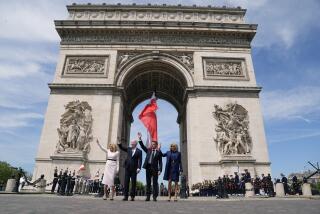Germany and France Try for Solidarity : Europe: Leaders stress mutual commitment. But their differences stand between them.
BONN — The leaders of Germany and France engaged in a public show of solidarity Thursday but appeared to make little headway in resolving the differences that have increasingly troubled one of the Continent’s key relationships.
Speaking at a news conference following a morning of talks here, German Chancellor Helmut Kohl and French Prime Minister Edouard Balladur seemed at pains to underscore their commitment to the bilateral relationship that has underpinned regional stability and fostered West European integration over the past three decades.
“Much of what was possible would have been impossible without this French-German cooperation,” Kohl told reporters.
The two leaders emphasized their commitment to the twin goals of economic and monetary union in Europe by the end of the decade, although Kohl’s insistence that stringent conditions for this union remain in place make the target date highly unlikely.
For much of the post-World War II era, ties between the two nations that had fought each other three times in the preceding century were based on a balance of German economic might and French political power.
But the end of the Cold War, the removal of the Soviet threat and the emergence of a reunified Germany--fully sovereign and far larger--combined to tip this balance sharply in Germany’s favor and rekindle old French fears of an assertive eastern neighbor.
A series of disputes ranging from trade and monetary issues to the former Yugoslav republics, culminated last month in the near-collapse of the European Monetary System when the German central bank, the Bundesbank, ignored French pressure and declined to reduce key interest rates.
The Bundesbank on Thursday refused for the second time in four weeks to lower its interest rates despite intense market speculation that it was ready to do so and continued pressure from recession-bound neighboring countries.
Although markets had widely expected the bank to drop the key 6.75% discount rate, there were no signs of a repetition of the chaos on currency markets that followed the Bundesbank’s last decision not to lower rates.
France has been the most outspoken critic of the Bundesbank’s policy of high interest rates and Thursday’s inaction was likely to irritate relations further.
“The conflicts of interest are growing, the hinges (of the relationship) are getting weaker,” declared Josef Joffe, the foreign editor of the Sueddeutsche Zeitung in a signed commentary.
Writing in the British newspaper the Independent, Irish commentator Conor Cruise O’Brien called the Bundesbank decision “the end of the French dream of the powerful German horse, responsive to the clever French rider.”
At one point Thursday, it appeared the “German horse” was indeed prepared to respond.
Seemingly ready to break ranks and back France on a highly controversial trade issue, Kohl spoke of German difficulties with portions of the so-called Blair House agreement, an understanding concluded last November in Washington that would commit the 12 European Community nations to the politically sensitive reduction of subsidized farm product exports.
The understanding was viewed as a potential breakthrough in efforts to resolve differences between Europe and the United States over subsidized exports and a significant step toward a new world trade agreement. But France balked, declaring its opposition.
On Thursday, Kohl seemed to side with France, saying, “We have . . . enormous problems with the agricultural part of the Blair House agreement.”
German abandonment of support for the agreement would amount to a major policy reversal and effectively torpedo the understanding.
Kohl’s stated willingness to consider detailed French proposals and work closely with France to arrive at a common European Community stance on the issue merely added to the impression that he had opted to ditch the agreement in favor of rebuilding ties with Paris.
More to Read
Sign up for Essential California
The most important California stories and recommendations in your inbox every morning.
You may occasionally receive promotional content from the Los Angeles Times.










